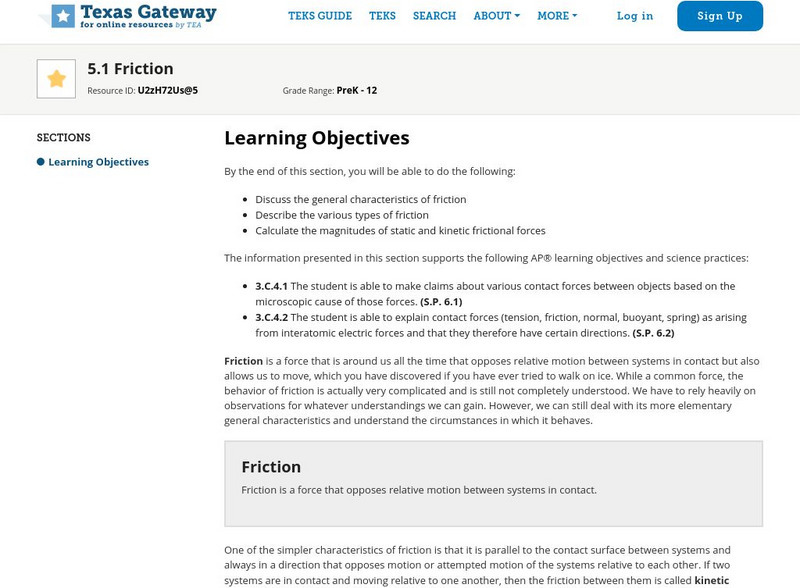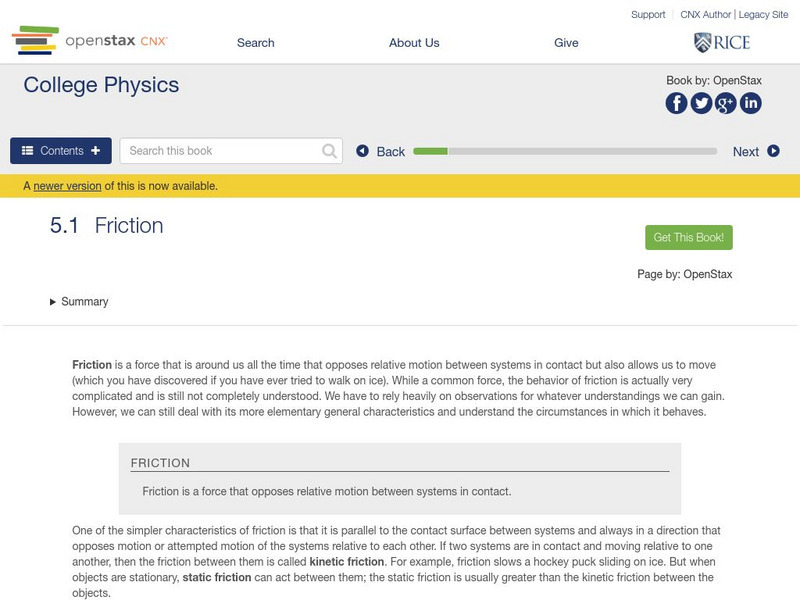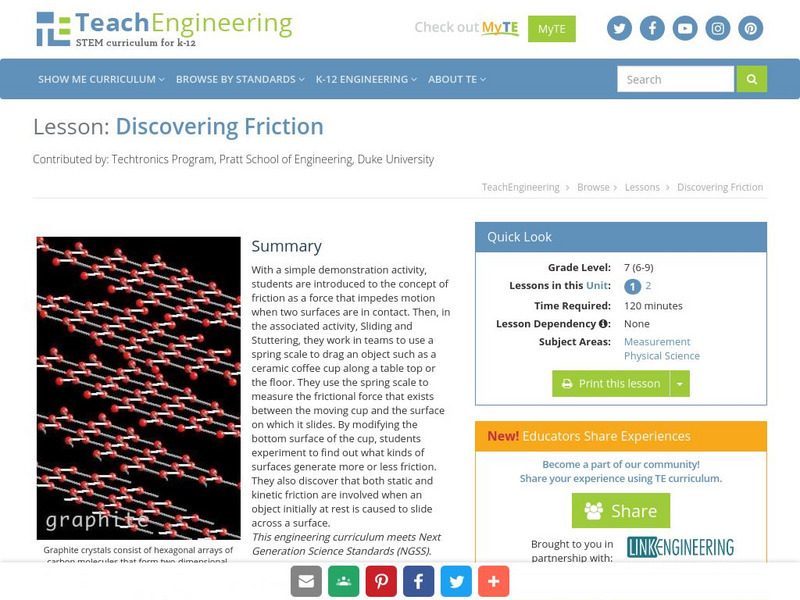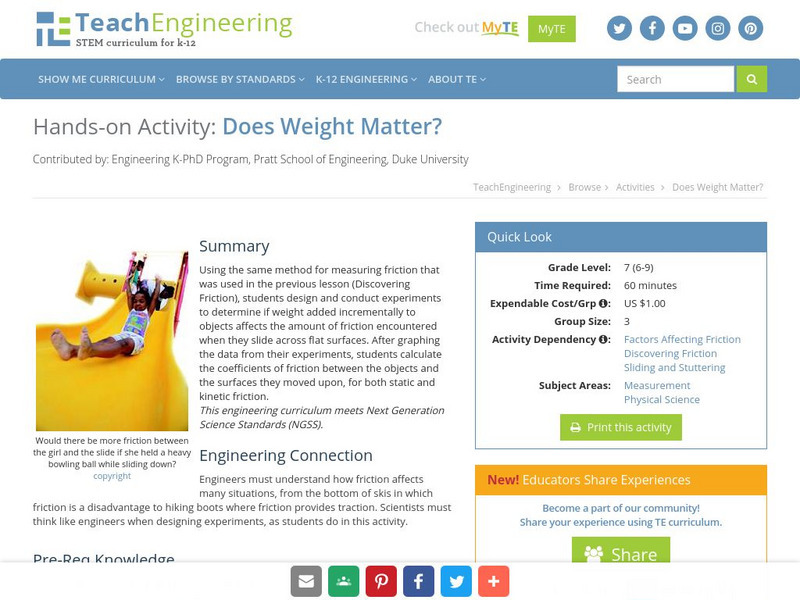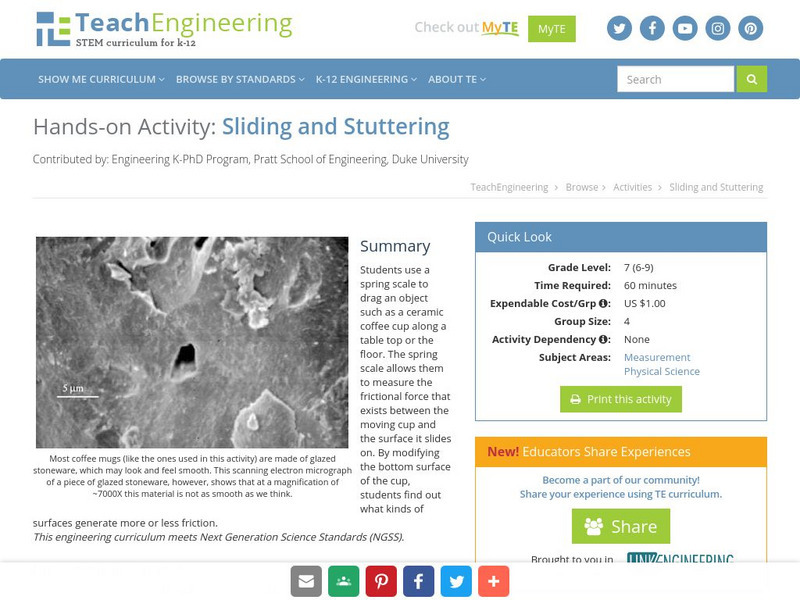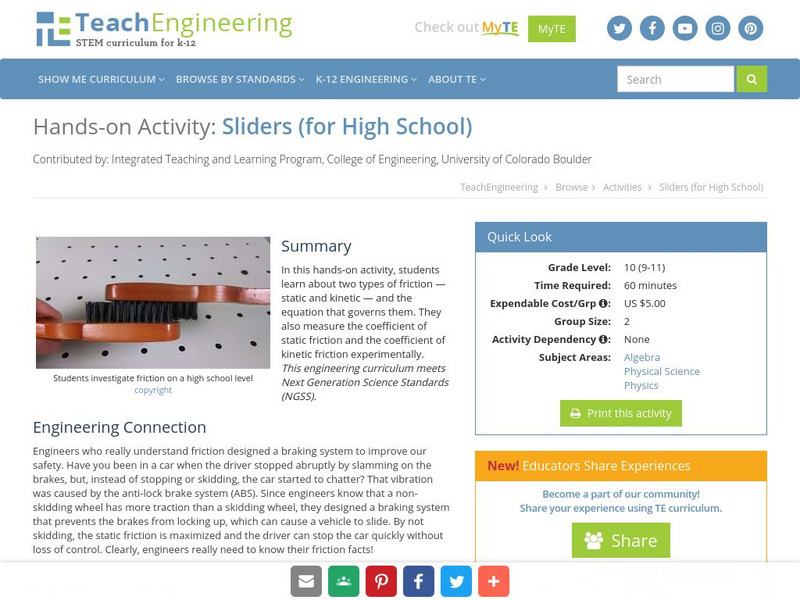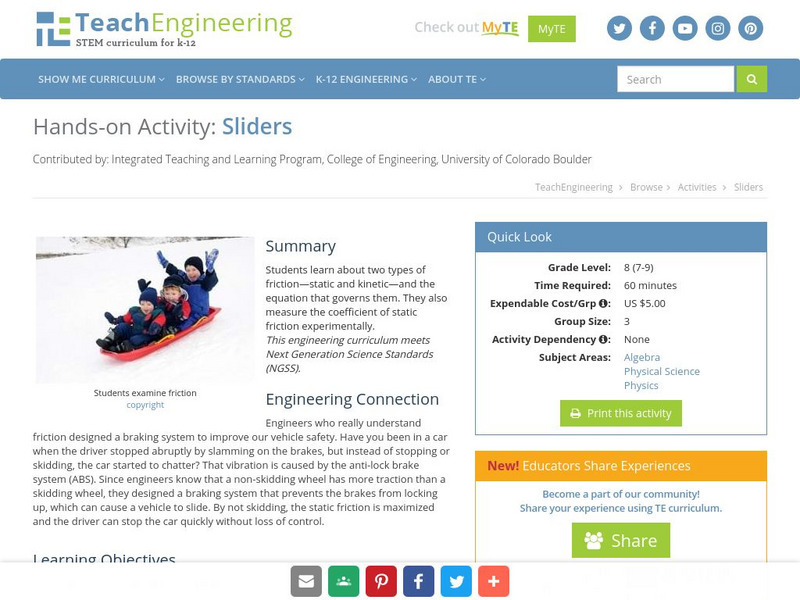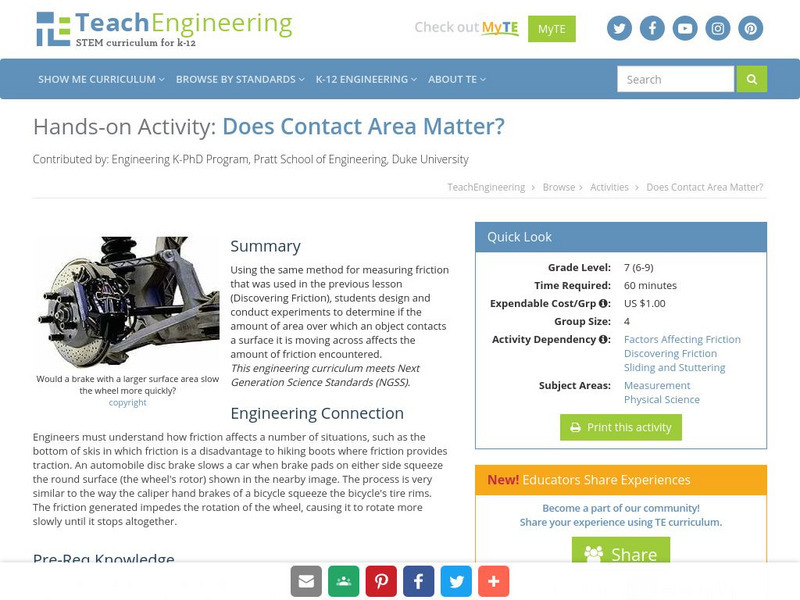Hi, what do you want to do?
Curated OER
Sliding and Stuttering
Ninth graders use a spring scale to drag an object such as a ceramic coffee cup along a table top or the floor. The spring scale allows them to measure the frictional force that exists between the moving cup and the surface it slides on....
Curated OER
Force/Newton's Laws/Friction
Young scholars describe how to recognize a force, define balanced and net forces, state Newton's first law of motion, explain why friction works, state Newton's second Law of Motion, and explain why the direction of force is important.
Curated OER
Sciences Working Together
Students research articles about science technology and society. In this science and technology lesson, students answer questions about an article they chose. They share what they learned with their peers.
Curated OER
Circle of Pong
Students, in groups, use given materials to devise a way to deposit a ping-pong ball into a paper cup that is located in the middle of a 6-foot diameter circle, while standing outside the circle.
University of Alaska
University of Alaska Fairbanks: Static and Kinetic Friction
Explains what static and kinetic friction are, what their coefficients of friction are in different scenarios, and how these concepts are applied when looking at automobile braking distances and vehicle control when driving.
New York University
New York Univ.: Tandon School of Engineering: Static and Kinetic Friction [Ppt]
Explains what static and kinetic friction are and discusses the coefficient of friction for different situations. Presents two simple lab experiments and real-life examples of friction in action.
Texas Education Agency
Texas Gateway: 5.1 Further Applications of Newton's Laws: Friction
By the end of this section, you will be able to discuss the general characteristics of friction, describe the various types of friction, and calculate the magnitudes of static and kinetic frictional forces.
OpenStax
Open Stax: Friction
In the following interactive students will begin to discuss the general characteristics of friction and describe the various types of it. They will also calculate the magnitude of static and kinetic friction.
TeachEngineering
Teach Engineering: The Force of Friction
In the first of two lessons of this curricular unit, students are introduced to the concept of friction as a force that impedes motion when two surfaces are in contact. Student teams use spring scales to drag objects, such as a ceramic...
TeachEngineering
Teach Engineering: Discovering Friction
With a simple demonstration activity, students are introduced to the concept of friction as a force that impedes motion when two surfaces are in contact. Then, in the Associated Activity (Sliding and Stuttering), they work in teams to...
Science Struck
Science Struck: Static Friction vs. Kinetic Friction: The Differences
Teaches what friction force is, the difference between static and kinetic friction, and how friction force is calculated.
TeachEngineering
Teach Engineering: Does Weight Matter?
Using the same method for measuring friction that was used in the previous lesson (Discovering Friction), students design and conduct an experiment to determine if weight added incrementally to an object affects the amount of friction...
TeachEngineering
Teach Engineering: Factors Affecting Friction
In this lesson, students use previous knowledge about friction to formulate hypotheses concerning the effects of weight and contact area on the amount of friction between two surfaces. In the Associated Activities (Does Weight Matter?...
TeachEngineering
Teach Engineering: Sliding and Stuttering
Students use a spring scale to drag an object such as a ceramic coffee cup along a table top or the floor. The spring scale allows them to measure the frictional force that exists between the moving cup and the surface it slides on. By...
TeachEngineering
Teach Engineering: Sliders (For High School)
In this hands-on activity, students learn about two types of friction - static and kinetic - and the equation that governs them. They also measure the coefficient of static friction and the coefficient of kinetic friction experimentally.
TeachEngineering
Teach Engineering: Sliders
In this hands-on activity, students learn about two types of friction - static and kinetic - and the equation that governs them. They also measure the coefficient of static friction experimentally.
Cosmo Learning
Cosmo Learning: Newton's Laws
Do you need to review any of Newton's three laws? This website contains a video collection on Newton's Law from a physics course at East Los Angeles College. In twelve lectures, each law is explained with examples. Also discussed is...
Physics Aviary
Physics Aviary: Practice Problems: Newton's Law System Both Frictions Problem
Students must find out different things for a series of object's moving as a system with Friction. In this problem students will be given both a static friction coefficient and a kinetic friction coefficient.
TeachEngineering
Teach Engineering: Energy of Motion
By taking a look at the energy of motion all around us, students learn about the types of energy and their characteristics. They first learn about the two simplest forms of mechanical energy: kinetic and potential energy, as illustrated...
Massachusetts Institute of Technology
Mit: Open Course Ware: Courses: Physics: Classical Mechanics
College-level online course highlighting the study of classical mechanics. This course focuses on Newtonian mechanics, fluid mechanics, and kinetic gas theory. Course features include a 35 video lecture series by Walter Lewin. Also link...
CK-12 Foundation
Ck 12: Physics Simulation: Sprinter
[Free Registration/Login Required] Learn about static friction, kinetic friction, and slipping in the context of human motion using this interactive simulation. A PDF worksheet and a video tutorial are also available. [3:38]
Science4Fun
Science4 Fun: What Is Friction
What is friction? Illustrated discussion of friction including the three types, its importance, and why it is avoided.
TeachEngineering
Teach Engineering: Does Contact Area Matter?
Using the same method for measuring friction that was used in the previous lesson (Discovering Friction), students design and conduct an experiment to determine if the amount of area over which an object contacts a surface it is moving...
TeachEngineering
Teach Engineering: What a Drag
Students learn about friction and drag - two different forces that convert energy of motion to heat. Both forces can act on a moving object and decrease its velocity. Students learn examples of friction and drag, and suggest ways to...










![New York Univ.: Tandon School of Engineering: Static and Kinetic Friction [Ppt] PPT New York Univ.: Tandon School of Engineering: Static and Kinetic Friction [Ppt] PPT](https://static.lp.lexp.cloud/images/attachment_defaults/resource/large/FPO-knovation.png)
